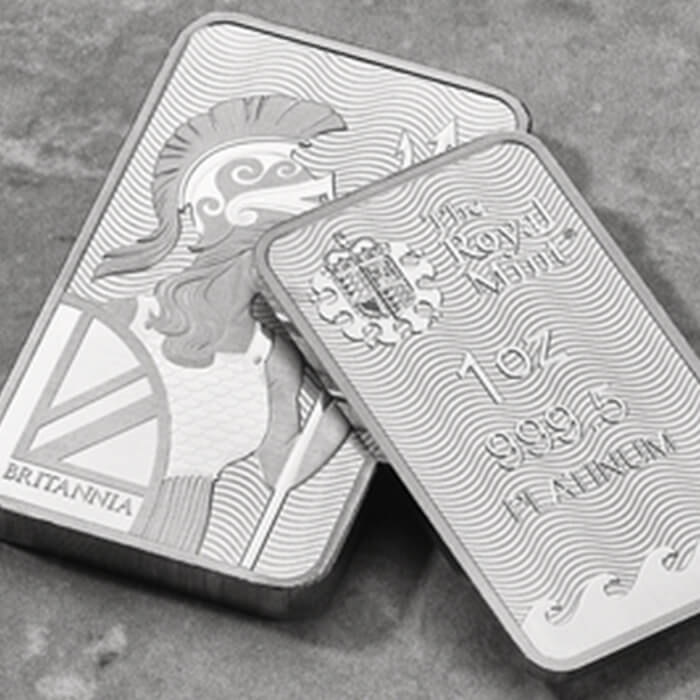![Web Desktop Hero Banner [1600×800].png](/globalassets/bullion/_new_structure/discover-bullion/guides/market-updates-2023/february/web-desktop-hero-banner-1600800.png)
Precious Metal Prices
February opened with a gold price of $1,925.60, comfortably above the $1,900 barrier after much fluctuation throughout January. Although the price peaked as high as $1,954.90 on 2 February, we have since seen a steady decline, with a closing price of $1,873.25 on 6 February.
Silver also saw a steady rally over the start of the month, reaching a new 2023 high of $24.43 before declining again to a low of $22.38 by 6 February. In percentage terms, platinum saw the biggest fall from a high of $1,032 on 2 February to a low of $976 on the sixth – a loss of 5.42%.
The recent price fluctuations seen were in part influenced by the Federal Open Market Committee (FOMC) meeting last week, which concluded with a 25-point hike in the Fed funds target rate to 4.50-4.75%. The markets were taken by surprise by Federal Reserve chairman Jerome Powell's mild tone at the press conference, where he discussed the different sets of inflationary forces (goods, housing, and services excluding housing) on the US economy. In addition, the January Nonfarm Payroll figures released later in the week showed a strong labour US market, with a gain of 517,000 jobs and unemployment dropping to 3.4%. This caused a rally in the dollar and a decline in the price of gold, which dropped below its 10 and 20-day moving averages.
LBMA 2023 Annual Precious Metals Forecast Survey
Early February saw the release of The LBMA 2023 Precious Metals Forecast Survey, which combines price predictions from a number of market commentators for gold, silver, platinum and palladium.
The survey reports that analysts are cautiously optimistic about gold and silver prices in 2023, with an average forecast of a 3.3% and 8.8% increase respectively by the end of the year. That of palladium is expected to fall by 14.3%, whilst the platinum price is expected to rise by 12.5%.
Amongst the key drivers for the price of gold were the US dollar and the Fed’s monetary policy, in first place at 43%. The second most important factor was regarded to be inflation, at 14%, whilst geopolitical factors took third spot at 11% – a factor not even deemed significant in last year’s survey.
![Article Secondary Image [1000 x 500].png](/globalassets/bullion/_new_structure/discover-bullion/guides/market-updates-2023/february/article-secondary-image-1000-x-500.png)
Central Bank Gold Holdings
Global central banks purchased a record 1,136 tons of gold in 2022, marking a 152% increase from 2021 and the highest amount bought in 55 years, according to the World Gold Council (WGC). Total annual demand rose 18% to 4,741 tons in 2022, the highest since 2011. The WGC credits the surge in demand to ‘colossal central bank purchases, aided by vigorous retail investor buying,’ as well as geopolitical turmoil and 40-year high inflation.
WGC data showed that emerging markets led the buying spree, with Turkey's central bank purchasing a record 542 tons of gold. Other significant buyers included China, India, Qatar, UAE, Egypt and Iraq.
China
China's gold production in 2022 saw a 13.09% year-on-year increase, totalling 372.048 tonnes, according to data from the China Gold Association. Meanwhile, gold consumption declined 10.63% to 1,001.74 tonnes, with a drop in both gold jewellery consumption and investment in bars and coins. The high gold prices in the global market, driven by factors such as geopolitical crises, a slowdown in the economy, and rising inflation were said to have been contributing factors.
India
India's 2022 gold consumption saw a three percent decline from the previous year due to high local prices, which dampened demand in the key December quarter, according to the World Gold Council (WGC). The Council predicts that gold consumption to March 2023 may pick up, with an improvement in rural demand and an increase in demand from weddings.
Last week, dealers in India offered discounts of up to $42 per ounce over official domestic prices – their highest level in 10 months – compared to the previous week's discount of $24. This increase was due to the record high prices of gold in India, where most bullion is imported, and prices include a 15% import duty and a three percent GST.
Russia
Russia bought a record-breaking amount of gold bars in 2022 due to tax cuts on precious metals. The government abolished its 20% VAT on physical gold trades for individuals and exempted profits from selling gold bars from income tax, leading to increased demand. More than 50 tons of gold bars were bought in 2022, ten times the amount purchased the previous year. The majority of bars sold were 1kg bars, accounting for about 60% of total sales.
![Article Tertiary Image [1000 x 500].png](/globalassets/bullion/_new_structure/discover-bullion/guides/market-updates-2023/february/article-tertiary-image-1000-x-500.png)
AI Support for Gold Bars
The LBMA has selected optical AI developer Alitheon as a support for its Gold Bar Integrity (GBI) initiative. The GBI aims to digitally monitor gold's movement through the global supply chain for transparency and to reduce the risk of illicit trade. The ‘FeaturePrint’ technology used is said to ensure provenance and identification of precious metals using machine vision algorithms and a standard camera or mobile phone. The technology could also be used in other applications such as luxury goods, art and collectibles.
The Royal Mint
Earlier this month we submitted almost 10,000 coins for testing at the UK’s oldest judicial ceremony, the Trial of the Pyx, held at Goldsmiths’ Hall in the City of London. The 700-year-old ceremony aims to protect consumers by upholding the quality of the nation’s coinage through rigorous testing. This year’s ceremony marked a significant moment in history, with the submission of the largest coin ever created by The Royal Mint, a 15kg gold coin made to celebrate the Platinum Jubilee of Her Late Majesty Queen Elizabeth II. Also submitted were the first official UK coins bearing His Majesty King Charles III’s official portrait, including a special £5 Crown and a 50 pence coin. This year’s ceremony marked the first time in several decades that coinage bearing the effigies of two monarchs was submitted for testing at the same time.




